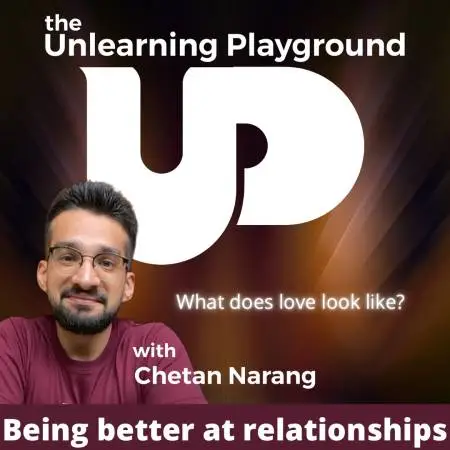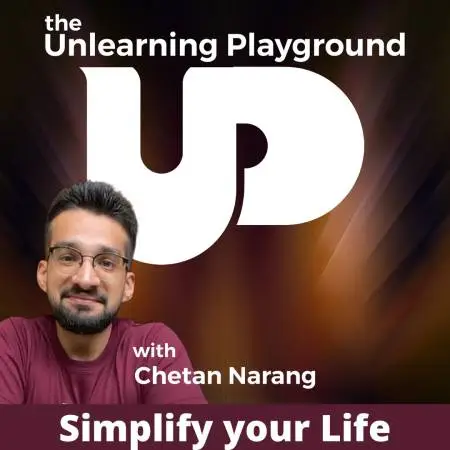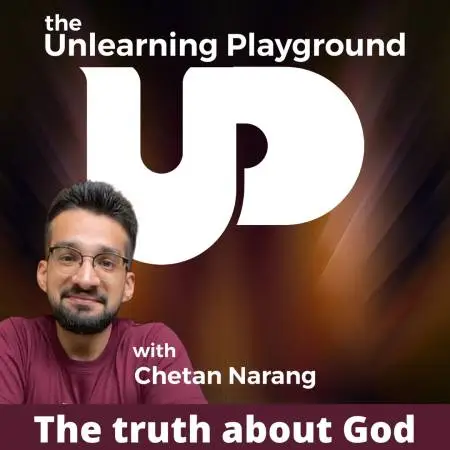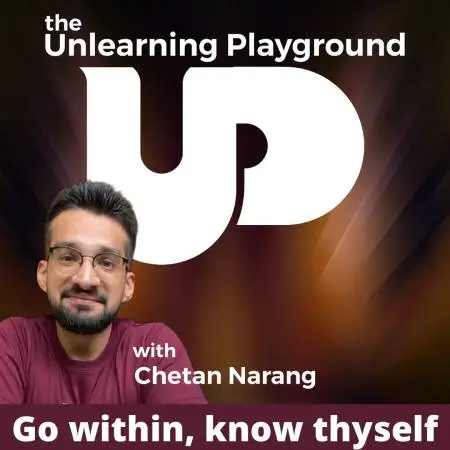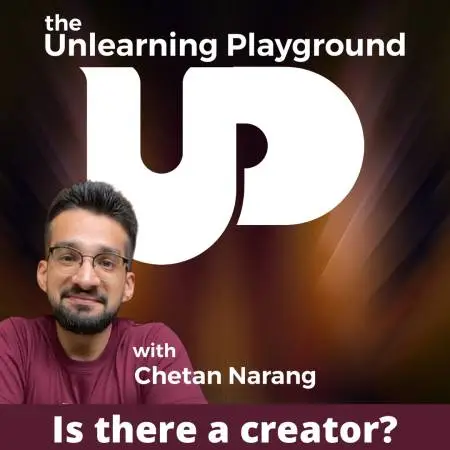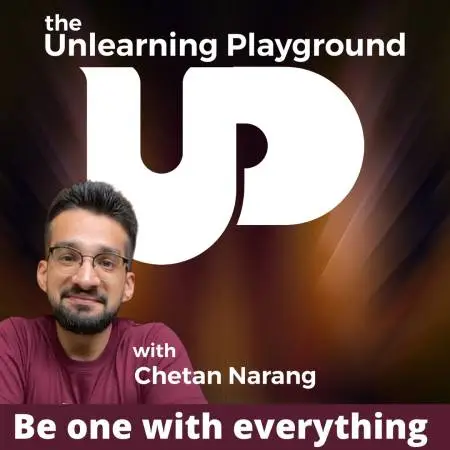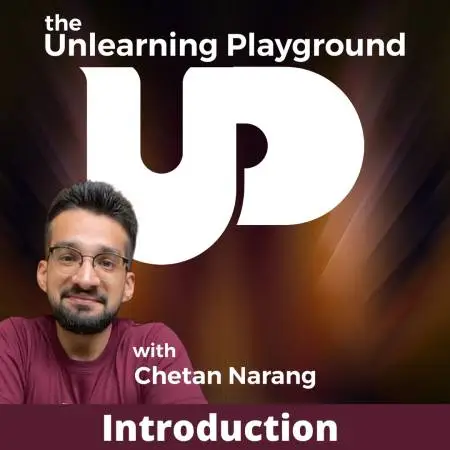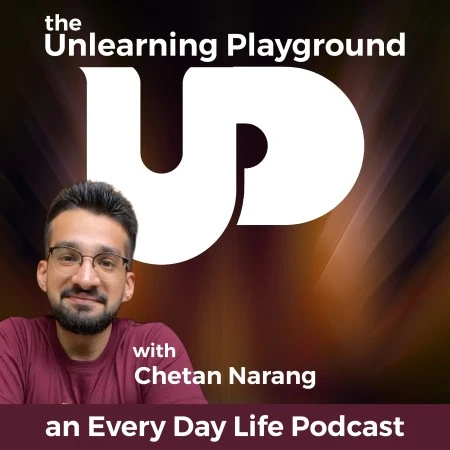A man sees in the world what he carries in his heart.
Johann Wolfgang von Goethe
Join me as I build on one of the most influential quotes I’ve had the good fortune of coming across – “We see the world as we are, not as the world is.”
Cognitive biases and logical fallacies govern so much of our day-to-day thinking that it’s almost mind-boggling when we encounter them for the first time. In this episode, I talk about the three levels at which our perceptions color the world we see.
Something that I always talk about is how you need to become the adult you never had around you as a child or as an adolescent. Becoming aware of, and unlearning the attachment to, our own biases and delusions is a major chunk of the work everyone needs to do to really become an adult.
So hop on. Let’s grow up together. I’ll see you in the playground. Pun intended!
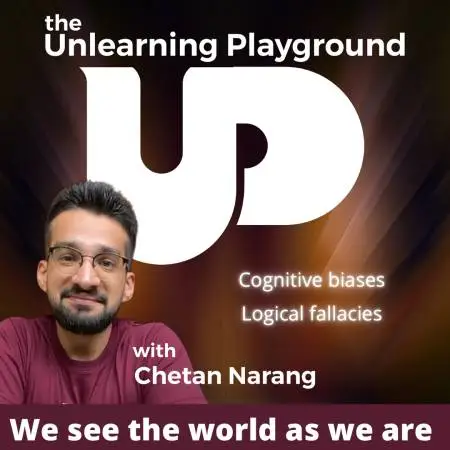
Check it out on your platform of choice.
Or listen on the custom player below
I’ve been wanting to do an episode on human biases and logical fallacies ever since I started this podcast, because it is so central to the majority of the work that needs to be done by all of us to grow up. And if anyone asks me why that is the case, I tell them this one quote which is one of the most profound ones I’ve ever heard, “We see the world as we are, not as the world is.”
I’ve heard so many versions of this that I cannot really say whom to attribute it to anymore. But that is beside the point anyway.
If you’ve never come across this quote before, or have never given it much thought, just hear me out, I’ll be building on it for the next few minutes here.
Our perceptions colour the world we see. Our perceptions, in that sense, also limit the world we see.
Have you ever had a feeling that everything around you is absolutely bullshit – the job you’re in, the book you’re reading, the course you’re pursuing, the person you’re in a relationship with, the people around you, etc. etc.
I’m sure you have. If you’ve lived enough years in this world, I’m sure you have. We all have.
And by the same token, I’m also sure that all of you who are listening to this right now, have also come out of it on some day and faced with the same job, the same book, the same course or the same people, you’ve felt, “Ahh! This is not so bad after all!”
What exactly happened there? How do you understand this dynamism of polar opposite feelings about the exact same thing?
The answer, of course, is that your perception of something or someone at both those moments depended more on YOU than that particular something or someone.
Let me say that again – At both these moments, your perception of something or someone depended more on YOU than on that something or someone.
How often do we acknowledge that? How often do we realise that? That is a question to ask yourself, and you must permit yourself to sit honestly with the answer.
Welcome to the world of human cognitive biases! These biases operate under the hood on so many levels that it is almost mind boggling when you encounter them at first. So fasten your seat belts, we’re gonna take a topsy-turvy ride through the three levels our biases and fallacies work through us.
The first of course is like the example I just gave you. The adjectives that pop into our heads at any moment are fuelled, in part of course, by everything else going on inside us at that moment.
If you’re having a bad day, if you’re in a bad mood, the same episode of FRIENDS which otherwise would have you in splits would not even warrant a single reaction from you. Except maybe a little pity for whoever was having their leg pulled in Central Perk in that episode.
Even if you didn’t get the FRIENDS reference or if you do not like the show for whatever reason anyway, I hope you can still catch the drift of what I’m trying to convey.
For another example: I know that I’ve had days when my favourite dish didn’t really taste as good as it would have if only I was in a better mood while eating it.
That should be relatable I hope. We’ve all had these experiences. The important thing to understand is that more than the episode or the food or any of those experiences, it is the one who’s having those experiences that determines the adjectives that describe that moment for them.
At any moment, we see the world as we are at that moment.
Now onto the second level.
Our biases and perceptions work on another deeper level too. As human organisms, our brains have been conditioned by years of natural evolution to behave in certain patterns and react in certain ways to certain signals. And we just can’t help it.
Ever heard of the hollow face mask illusion? It is a popular optical illusion, you can very easily check out some video illustrations of it on Youtube. In short, imagine a hollow face mask with the protruding side pointing towards you. So the nose of the mask points towards you. Now the mask is rotated and by the time the nose has gone to the background, you would expect to see a depression right? Because the nose is facing the other side now. But you’d be surprised to see that we actually see the nose to be protruding outwards again! It’s actually quite fascinating.
And the scientific explanation for that is that our brains have evolved over the years to see faces protruding outwards, and we cannot help but see it in that manner!
We see the world as we are, not as the world is.
The same bench in the neighbourhood park that you see as obviously green, might appear confusingly red to a color blind person.
The same gesture from a person might be interpreted as a sexual advance by a hormone-ridden 21 year old or just a friendly wave by a 52-year old.
The mind of a dehydrated person, or a person who hasn’t been out in the sun for a few days in a row is more likely to produce depressing, even suicidal thoughts.
This is all just basic biology. Just the way our bodies are wired.
And this wiring colours the way we perceive the world around us.
One more level, the third one, at which our perceptions colour the world we experience is at the level of our conditioning. In short, the story in our heads of the world around us. A person who has grown up hustling their way through life, you know, competing with siblings for the love of their parents, competing with classmates for the highest score in an exam, etc. Such a person may see life more or less as a game of one-upping everyone around them, as a race, even as a dog-eat-dog world in an extreme scenario.
While another person who has the inclination towards and also, due to a variety of factors, had let’s say the opportunity to be more easy with their pursuits, might go about looking at life as a means to express their most creative endeavours. Almost going through Life as a musical number instead of a journey.
Both of them have very different models of the world in their heads. Both of them are right, but both of them are limited, both of them are incomplete if they do not see the other side of the equation.
Which brings us to the gist of why we need to become aware of our own particular biases.
Incomplete is something no one really wants to be . And one sure way to remain incomplete is to remain immersed in one’s own thoughts, ideas and biases, and never really examining or challenging them.
At any rate, it is suitable for us as a species to expect our adults to recognise where they themselves are wrong, are biased, and are incomplete. How else would they lead the children and the adolescents?
One quote that comes to my mind right now is one of Wittgenstein. He said, “The limit of my language is the limit of my world”. Quite simply, it means that the limit to which I understand Life is determined by the limit to which I have words for or mental images for or at least metaphors for.
Which is why, the next few episodes of this podcast are going to be dedicated to understanding, and putting into words, the numerous different cognitive biases and logical fallacies we human beings function under. There are a whole bunch of them, and I’m sure that as I embark upon this journey to collate all of them in a digestible manner, I will miss out on some. But I can guarantee that any listener who goes through this road with me would arrive at the end more equipped than when they started.
More equipped on how to point out and catch themselves when they are not being the best version of themselves and are not being objective enough,
More equipped on how to point out to the ones they love and care about, where they aren’t being the best version of themselves and are not being objective enough.
And very importantly, more equipped on how to wrap their heads around the fact that all of us, all of us are more same than different. The ones we love, and also the ones we love to hate. The difference between man and man is one of degree and not of kind, as that man Swami Vivekananda said.
One thing I wish to call out before we embark on this journey though is that we’re not taking this journey to be more ashamed of ourselves, to feel low about not being perfect and all of that jazz. Not at all.
The idea is in fact just the opposite. The idea is to become aware of yourself in a manner that enables you to accept yourself as you are. Almost as a parent lovingly accepts their child, you as an adult have to lovingly accept your inner child, as my man Rocco calls it, and tap it on it’s back by saying, “It’s ok. It’s in your nature to be so.”
And to be able to do that authentically, a certain degree of understanding is needed. That understanding is what we’re embarking upon in this journey.
To be honest, I can’t wait to get down to work and design the coming episodes, but I wish to end this episode with a little story. Those of you who know me, know that I love to tell stories, especially when they drive home the point in a manner no amount of reasoning and logic can.
So here goes.
A man once visited a Zen master and asked him, “I am new in this town and am looking to move here. How is this place?”
The master asked him, “What is it like in your current town?”
The man replied, “It’s horrible. Everyone is mean and selfish. I just don’t like it there.”
The master replied, “Don’t move here. It would be pretty much the same here too.”
Later the same day, another man visited the master and asked him the same question, “I am looking for a new town to move to. Would you advise me to start living here in your town?”
The master asked him, “What is it like in your current town?”
The man replied, “It’s great. Everyone is friendly and helpful. I love it there.”
The master replied, “You can move here. It would be pretty much the same here too.”
Now the point of this story isn’t that there aren’t environments you shouldn’t be moving out of. Absolutely not. There absolutely are situations which you should permit yourself to walk away from, but that is a topic for another episode.
For the purpose of this episode, the point of this story is that we see the world as we are, not as the world is.
And if that didn’t seem to you to be the point of the story, that should tell you more about yourself than about the story. Check out the episode here again.
Thank you for spending these past few minutes with me here. As usual, the show notes contain the links to my Instagram page, and my Youtube channel too. If the content you just consumed seemed of value to you, please consider checking out these channels too. I’m sure you’ll dig it.
And of course, it goes without saying – share this with your community if you think it’ll help them.
Until next time, peace out!





